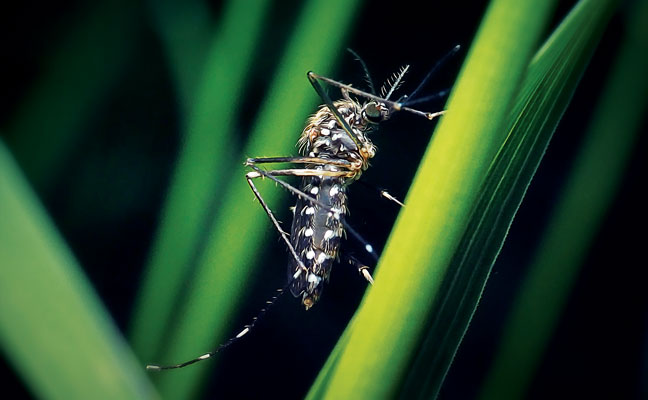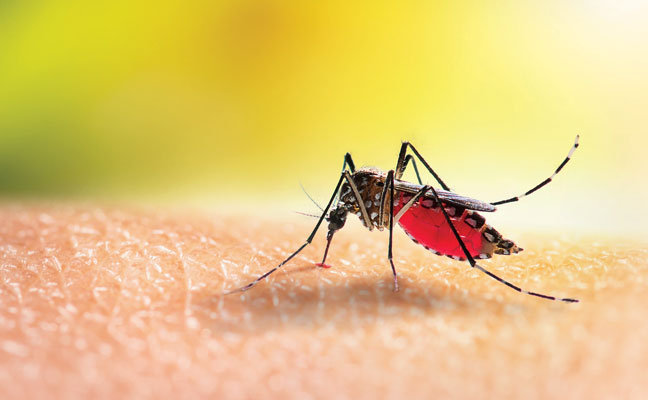
Photo: irina88w / iStock / Getty Images Plus / Getty Images
With mosquito management services, the work of a pest management professional (PMP) is obvious to residents enjoying their backyards, customers dining on restaurant patios and children playing at city parks.
When PMPs reduce mosquito populations, however, they do more than make the outdoors more enjoyable. They help keep the community safe from vector-borne illnesses.
“There’s a growing awareness and concern about the diseases spread by mosquitoes, leading to an increased demand for professional mosquito control services,” says Jeffrey Zeiber, ACE, pest control manager for Getem Services in Norfolk, Va. “This demand makes it a potentially lucrative service offering for pest control businesses.”
Protecting people

Jeffrey Zeiber
Last summer, malaria cases in the United States made news because local transmission occurred in Florida, Maryland and Texas. The fact that nine residents picked up the illness in the United States and not while out of the country was an important distinction, as about 2,000 cases of the disease are reported in the United States each year by people returning from trips overseas, according to the Centers for Disease Control and Prevention (CDC).
Many PMPs embrace their ability to help protect health and property. Pest Management Professional’s (PMP’s) 2024 Mosquito Management Survey shows 61 percent of those who responded said their pest control company’s mosquito management promotional or advertising materials mention the protection of public health.
In addition, 52 percent of survey respondents say customers specifically ask whether services will manage mosquitoes that may transmit viruses and diseases, such as Zika virus, West Nile virus, dengue and malaria.

Scott Hornemann
“Mosquitoes can carry diseases that can harm your customers’ health,” says Scott Hornemann, ACE, who serves as the field training, quality and safety director for Adam’s Pest Control in Medina, Minn. “We are in business to make money, but more importantly, we are in business to protect the health of our friends and neighbors.”
Improving outdoor spaces
David Price, ACE, director of technical services for Mosquito Joe Franchising, a Neighborly Company, in Virginia Beach, Va., says the firm’s mosquito control services complement the public vector control programs that protect the health of people and their pets.

David Price
“We allow people and pets to enjoy their backyards and make outside fun again,” he adds. “We receive thousands of stories each year from folks who say, ‘Finally, my child can play in the backyard without extreme itching or bumps and being miserable for days.’”
Indeed, mosquito control services offer customers a noticeable improvement in quality of life.
“High mosquito populations will keep people from enjoying outdoor activities, so reducing the populations can
be a huge relief,” notes Mantis Pest Solutions Training Manager Alex McCurter, of Lee’s Summit, Mo.
Selling the service

Alex McCurter
A customer’s desire to enjoy the outdoors makes mosquito control services an easy sell for many PMPs.
“We live in a world where people are looking for value in any industry, including ours. Both residential and commercial properties are more appealing when they are mosquito-free,” says Aaron Garza, owner of Lone Star Pest Management in Conroe, Texas. “Property owners, including homeowners, businesses and municipalities, may be willing to invest in mosquito management services to create a more attractive and comfortable environment.”
Word-of-mouth helps attract new customers, particularly in existing customers’ neighborhoods.
Helen Caloz, office manager at HomeMasters Pest Control in Smithfield, N.C., suggests selling mosquito control services to a customer’s neighbors on both sides and behind them, which will not only build revenue but also help ensure the customer’s yard is protected on all fronts. Often, satisfied customers are happy to help promote a company’s exemplary services.
“Most people ‘buy’ from someone they already know, so their own neighbors are the best salespeople,” she says. “We provide incentives to our customers any time they refer a new customer.”
Using the right tools

Jay Groat
Jay Groat, owner of Bug Bee Gone in Delmar, N.Y., says he offers mosquito control services to keep his current and new customers in a one-stop shopping mode; there’s no need to call another PMP.
“Being able to do just about everything is an advantage,” he says. “In my area, ticks are a big problem, and people are aware of the health issues both mosquitoes and ticks can cause. They are almost the same services with the same materials and equipment. Try bundling these add-on services to generate more revenue.”
If it’s been a while since you reviewed your service fees, take the time to periodically reevaluate them.
“Know your pest pressure, materials and labor costs, and create a price structure that pays you for the quality of service you provide,” Hornemann says. “In short, get paid what you are worth. You are ensuring the health and safety of your customers with this service.”
Suppliers regularly release new and improved mosquito control methods, so don’t hesitate to check out what’s new.
“Utilizing the right tools in the right places will reduce callbacks and increase profitability,” Price says. “Also, get the frequency and timing right to affect the mosquito life cycle.”
Callbacks are under control for most of the PMPs who answered our 2024 Mosquito Management Survey, as 94 percent reported a callback rate of 9 percent or less.

Photo: FrankRamspott / E+ / Getty Images
Watching the weather
Another factor that has an impact on mosquito control is the weather. Last year, PMPs experienced several weather-related challenges, including drought, heavy rains and record high temperatures.
“We track the weather closely and will issue email alerts to customers with recommendations regarding their safety, as well as what to do once the weather event has passed,” adds Price. Tipping water out of any containers on the customer’s property is one such recommendation to help reduce mosquito populations.
At Mantis Pest Solutions, heavy rain forced the company to reschedule mosquito services several times. Of course, the inability to control the weather can prove frustrating. “When you have to push a monthly service into the next month, you lose revenue,” McCurter notes.
Setting expectations
Because weather is unpredictable, PMPs must find other ways to reduce callbacks. Managing customer expectations is a must.
“Provide customers with detailed information about mosquito behavior, life cycles, and the limitations of control measures,” Garza says. “Help them understand that achieving complete control is challenging, thanks to factors such as weather conditions, breeding sites, and the constant influx of new mosquitoes.”
Garza recommends providing customers with educational materials, such as brochures or online resources, that explain the complexities of mosquito control. It also helps to include information on preventive measures customers can take that complement your services.

Aaron Garza
HomeMasters Pest Control manages customer expectations with honesty and education. “This service doesn’t put a dome over your home and keep mosquitoes from ever flying in,” Caloz quips. “We’re targeting the eggs and preventing them from hatching, so general lawn care, and not allowing pooled water, are pivotal in making sure our service is effective.”
It is imperative to maintain mosquito control and not just get services sporadically throughout the summer months. “We stop the mosquito life cycle, but you have to consistently break it; it’s not a one-and-done service,” Caloz adds.
“As with most services, the earlier you start setting expectations, the better,” says McCurter. “Any time I pitch mosquito control, as well as begin the first service, I tell customers that some level of activity is inevitable. Our goal is to keep it at an acceptable level.”
Requesting cooperation
Enlisting the help of customers to help reduce mosquito populations between service calls is a tactic that often helps prevent callbacks.
“Because mosquitos are flying insects, you can’t guarantee complete control on someone’s property,” Zeiber says. The bigger question is, ‘How can the customer help with the service?’”
Walk around the property with your customer and show them the areas that need to be addressed. Standing water, piles of leaves, clogged gutters, full bird baths and water-filled tires are just a few of the problem areas common in yards and worth pointing out.
“Educating your customer on the life cycle of insects and their breeding habits will contribute to a successful business partnership with them,” Zeiber notes.
PMPs who provide mosquito management services are not only protecting their customers, but their communities, too.
“Mosquitoes can have a significant impact on public health, comfort and overall well-being,” says Garza. “Mosquito management services address public health concerns, contribute to community well-being, and offer practical solutions to the challenges posed by mosquitoes.”
Check out more results from the 2024 Mosquito Management Supplement.
Malaria makes an unwelcome comeback

Photo: panom / iStock / Getty Images Plus / Getty Images
Malaria is the leading cause of death in many countries, according to the Centers for Disease Control and Prevention (CDC). The risk of contracting malaria in the United States is low, although it is possible local transmission may occur again this year — just as it did last year in Florida, Maryland and Texas.
If customers ask questions about malaria, share the facts but don’t scare them.
Malaria is transmitted by an infected female Anopheles spp. mosquito. The CDC says people with malaria often experience a variety of symptoms, including fever, chills, and flu-like illness. Fortunately, the disease is curable if diagnosed and treated promptly. Anyone can get malaria, but it is not contagious.
Once prevalent in the U.S., “the country was declared free of malaria as a significant public health problem” in 1949, the CDC reports. That’s because in 1947, the National Malaria Eradication Program, a cooperative consisting of state and local health agencies from 13 southeastern states and the CDC, took steps to rid these areas of mosquitoes. The program accomplished this feat by applying dichlorodiphenyltrichloroethane (DDT) inside homes, removing mosquito breeding sites, improving drainage and spraying insecticides from aircraft in areas where malaria was prevalent.
For facts about malaria — including disease symptoms, prevention tips, and treatment options — visit the websites for the CDC at CDC.gov/malaria and the World Health Organization (WHO) at WHO.int/health-topics/malaria. — DS
Leave A Comment